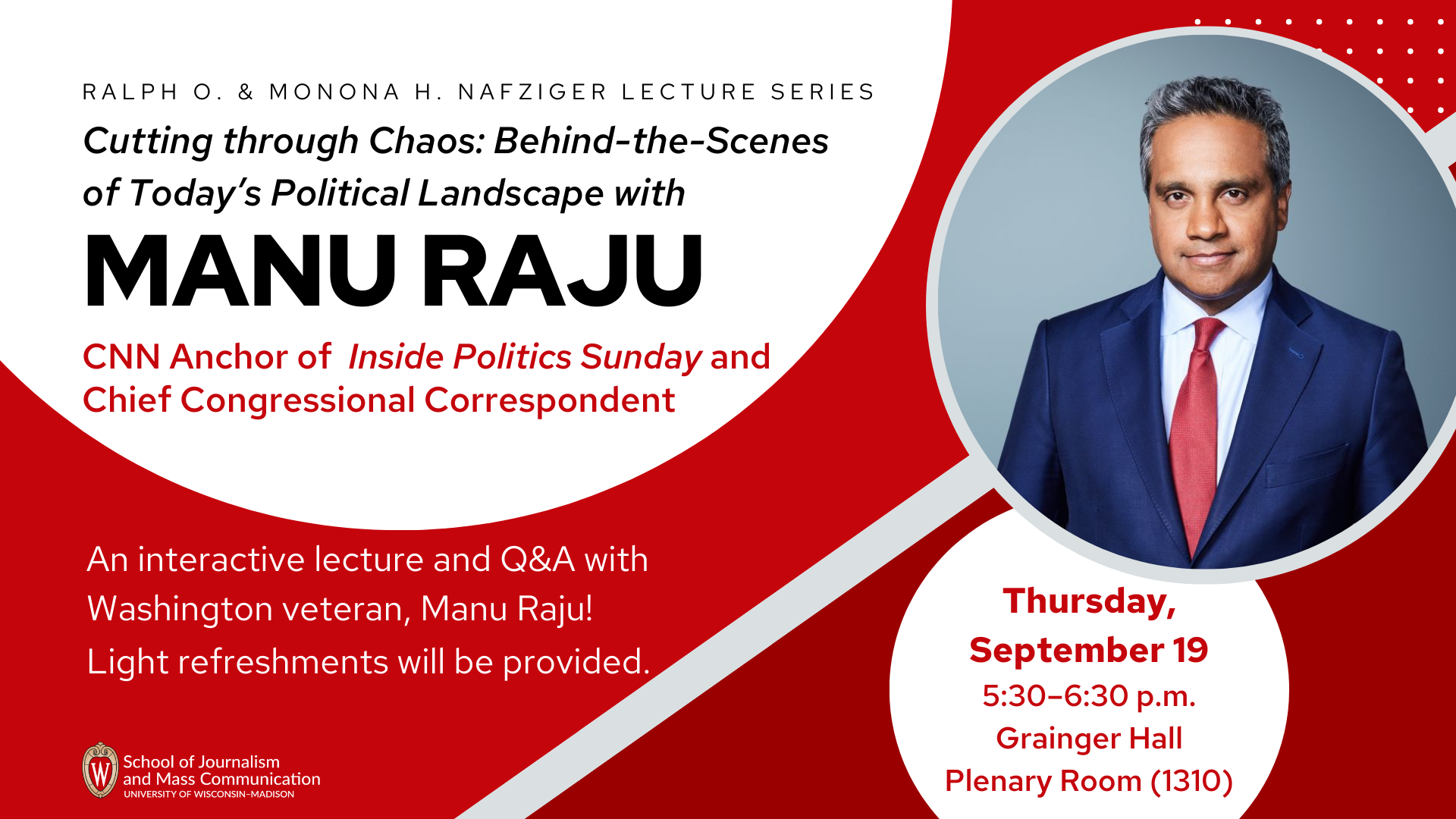
Join Manu Raju (’02), CNN Anchor of Inside Politics Sunday and Chief Congressional Correspondent, on September 19 for an interactive talk and Q&A. Raju has developed a reputation as a reporter who can find out what politicians are privately discussing out of the public’s view and is well known for his sharp and skillful questioning. In this timely talk, “Cutting through Chaos: Behind-the-Scenes of Today’s Political Landscape,” Raju will share an exclusive peek behind the curtain of what it’s like to cover politics today and how he navigates challenging stories and events.
Raju is a veteran reporter in Washington, having previously served as a top Capitol Hill Correspondent at Politico for seven years. Prior to his time at Politico, Raju reported for The Hill newspaper, Congressional Quarterly and Inside Washington Publishers. He has long been a frequent guest on political talk shows on TV and radio.
 Raju has won multiple journalism awards for his reporting on the major battles consuming Washington and his coverage of campaign politics. Most recently, in 2022, Raju was part of a team of reporters who won the David Bloom award from the Radio and Television Correspondents Association for their coverage of the Jan. 6 attack on the U.S. Capitol. In 2022, the Milwaukee Press Club also recognized Raju with its Sacred Cat award, given annually to a national reporter for making distinguished contributions to the field of journalism. In 2021, Raju was part of a team of CNN journalists who were selected as winners of the David Bloom Award by the Radio and Television Correspondents Association for their coverage of the Jan. 6 Capitol attack.
Raju has won multiple journalism awards for his reporting on the major battles consuming Washington and his coverage of campaign politics. Most recently, in 2022, Raju was part of a team of reporters who won the David Bloom award from the Radio and Television Correspondents Association for their coverage of the Jan. 6 attack on the U.S. Capitol. In 2022, the Milwaukee Press Club also recognized Raju with its Sacred Cat award, given annually to a national reporter for making distinguished contributions to the field of journalism. In 2021, Raju was part of a team of CNN journalists who were selected as winners of the David Bloom Award by the Radio and Television Correspondents Association for their coverage of the Jan. 6 Capitol attack.
Raju got his start in media working at the student newspaper The Badger Herald at the University of Wisconsin–Madison, his alma mater. And his writing roots extend to his late grandfather, Gopalakrishna Adiga, a legendary poet from South India who wrote in the language of Kannada.
Ahead of his talk, we talked with Raju about his career, advice to students hoping to pursue political journalism and what he hopes students will take away from his presentation.
Can you share a particularly memorable moment from your career?
Over more than two decades covering Washington, there have been no shortage of crises that have come my way – whether it’s been high-stakes elections, government shutdowns, near debt defaults, presidential impeachments or the unprecedented ouster of a sitting speaker. Plus, there have been an array of colorful characters and powerful pols I’ve interviewed along the way, whether it’s been John McCain, Nancy Pelosi, Kevin McCarthy or Barack Obama – plus many others. But one moment perhaps sticks out above the rest: Jan. 6, 2021.
I had expected a long day when I arrived at the Capitol that morning, but I obviously had no idea what was in store. I was reporting in the halls, as I typically do, interviewing House members and senators in the run-up to Joe Biden’s electoral certification in the House chamber. Then Republicans raised their first objection over Arizona’s electoral results, so both chambers began debate in their respective houses – and I returned to the Senate press gallery where I have a booth and a camera for live shots.
As I was monitoring the floor proceedings, there were signs things were getting jittery outside. First, a building by the Library of Congress had been evacuated over a suspicious package. Then things took a darker turn: the Capitol went into lockdown, something which I had only experienced one other time in my years covering Congress. We were told to lock ourselves in our offices. Then, we broke into our coverage of the floor debate, and I reported the news to our audience about the lockdown. Then moments later, we got word from U.S. Capitol Police that there was an internal security alert. That meant, there was a threat inside the building. I was live again reporting on the internal alert. A few minutes later, I learned through my sources and via my colleagues that the mob had broken into the Capitol – just feet away from where I was reporting. I continued regular live reports through the day and afternoon, relying on sources to give me details about what they were experiencing. A few hours later, we were finally evacuated by the police – and at that point, I realized how much danger we were in. It looked like a war zone outside the press gallery and throughout the Senate, something I reported on air as we were being escorted out of the building. We were taken to a secure location nearby where senators were sheltering. Hours later, they returned to the Capitol to complete the certification. But the Capitol – and our politics – would never be the same.
What trends or developments in political journalism are you currently observing, and how do you think they will shape the future of the field?
News travels lighting fast these days through social media – which is both a risk and reward. When I have news to break, and I post it on X, it will immediately get into the bloodstream and help shape and drive a storyline. That can be beneficial.
But the risk is that bad information can travel equally as fast – and that can also shape people’s perceptions of a story. Our job as journalists needs to be factual about everything we post, even if it’s a short tweet because anything can quickly go viral. Moreover, the other downside of the social media age is that readers may consume only a tweet rather than dig into a deeply reported story that is nuanced and is layered with key details. But deeply reported stories are still as critical as ever. In fact, in this age of media, people are looking for rock-solid facts and reporting they can trust – no matter the challenges the industry faces.
Were there any specific experiences at UW that sparked your passion for political reporting?
If it weren’t for the University of Wisconsin–Madison, I would never have become a journalist. I decided as an extracurricular in my freshman year to cover sports for the Badger Herald, hoping to meet some friends, go to some Badger games and maybe learn something in the process. But the more I got involved at the Herald, the more I began to love working for a newspaper. I eventually became sports editor and learned a ton along the way. It sparked my passion for journalism and made me make that fateful decision after college to move to Washington and look for a job. Now, I’ve worked for five news outlets here over my 22 years in DC.
What advice do you have for students who hope to pursue a career in sports media?
Follow your curiosity. Don’t just cover a game, write about what happened and move on to the next game. Try to understand the players, coaches and staff. Get to know what drives them. Interview everyone you can in the organization, or go have coffee with them and hear what they are focused on. That way you can pick up tips, develop sources and start to write stories that can help give readers a fresh perspective and new details about the teams they follow. It will allow you to write with authority when you have the inside details about what’s going on and why certain decisions are made.
What do you hope students take away from your upcoming presentation?
Take a risk in your life. Be persistent. And don’t be afraid to be green.
There may be an opportunity that comes your way, but it isn’t quite your dream job. It’s OK, roll the dice and learn from that opportunity – hopefully build on it. It may lead to your dream job or take you in an unexpected direction that shapes the course of your life. And if it doesn’t work out, that’s OK too. Learn from it.
If you get turned down for a job, don’t let it stop you. Persistence pays off. Work at it. Keep trying. Another door will open.
And never be afraid to say: “I’m new. Can you explain this to me?” It will work out to your benefit. It’s much worse to pretend you know something when you don’t!
Mark your calendar for September 19 at 5:30 p.m. for a timely and important talk with a seasoned political journalist and fellow Badger!